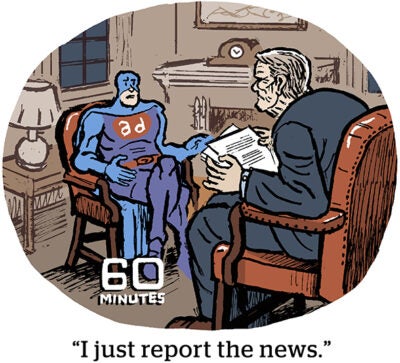The free, open internet requires advertising to support journalism. But during global events like wars, when online misinformation runs high, advertisers justifiably want assurance that they’re only supporting reputable news sources.
NewsGuard, a company that ranks the credibility of news outlets and licenses an inclusion list of approved publishers, wants to be the loudest voice in the conversation about which news sources are worthy of ad dollars.
The company’s latest initiative is focused on creating a whitelist of publishers based in Ukraine, where the news media market has seen a serious decline in advertiser spending since the Russian invasion began in February 2022. The goal is to identify publishers that are reporting on the conflict fairly so they can operate with advertiser support, said NewsGuard Co-CEO Gordon Crovitz.
This is the first time NewsGuard created a whitelist specifically for publishers in a nation embroiled in active conflict.
Media market collapse
In addition to losing personnel and infrastructure to the war, publishers have taken a massive revenue hit as the local Ukrainian advertising market collapsed.
Spending by Ukrainian advertisers has dropped by about two-thirds since the invasion began, said Chine Labbe, NewsGuard’s managing editor and VP of partnerships for Europe and Canada, who oversaw the Ukrainian whitelist project.
NewsGuard launched this project after Reporters Without Borders, an international nonprofit that supports press freedom and information access, reached out for assistance in getting Ukrainian publishers to complete assessments for its Journalism Trust Initiative (JTI). Like NewsGuard, the JTI creates a standard by which audiences and advertisers can separate misinformation from legitimate journalism.
NewsGuard worked with publishers to complete its own assessment while also guiding them through the JTI’s approval process.
In building its whitelist, NewsGuard evaluated 25 Ukrainian news publishers, including a mix of high-profile outlets with large readerships and other outlets facing operational difficulties caused by the war, Labbe said.
Methodology
The evaluation process relied on the same methodology NewsGuard uses for all its publisher ratings. That process weighs nine criteria, such as whether a site repeatedly publishes false or misleading content, corrects errors, discloses its ownership and financing and avoids deceptive headlines. Based on its evaluation of these criteria, NewsGuard assigns a publisher credibility score between 0 and 100.
NewsGuard appoints a team of journalists and editors to conduct these evaluations, typically drawing from local professionals who are familiar with the region’s media landscape.
The analysts complete a first draft that undergoes multiple layers of editing by senior analysts, Crovitz said. Crovitz and his Co-CEO, Steven Brill, review all assessments before they’re published.
Despite the fact that NewsGuard counts the Department of Defense as a client for its Misinformation Fingerprints project – which tracks phrases and hashtags associated with misleading content – there was no involvement by the US government in this evaluation process, Crovitz said, because the news ratings and the Fingerprints project are run independently of each other. The Ukrainian government was also not involved, he said.
Approved publishers
Publishers that achieve a rating of 60 or higher are eligible for inclusion in the whitelist. In cases where a publisher fell short of that mark, NewsGuard is working with those outlets to help them improve their score, Labbe said.
NewsGuard plans to expand the initiative to another pool of 25 Ukraine-based publishers. That assessment period should be complete by the end of Q1 2024, Labbe said. It’s also considering evaluating independent Russian news outlets.
As of this time, NewsGuard has no plans to launch a similar product for the Israel and Palestine markets amid the ongoing conflict in that region or in other regions currently affected by war, Labbe said.
No publishers paid NewsGuard to be included on the whitelist or to be evaluated, Crovitz said. NewsGuard never accepts any payments from publishers, he added, because doing so would be an “obvious conflict of interest.”
Publishers do, however, have to pay for JTI certification, Labbe said. But the JTI is a separate entity, and NewsGuard does not receive any compensation from those arrangements, she noted.
Adoption
The Ukrainian publisher inclusion list is available as part of NewsGuard’s overall whitelist. Clients can license it on an annual basis, either by paying a flat fee or on a CPM basis.
In addition to encouraging advertisers to run ads on whitelisted publishers, NewsGuard also advises them to “dial back keyword blocking,” Crovitz said. That way, their coverage of sensitive topics – like the war in Ukraine – isn’t demonetized, which would defeat the purpose of the whitelist.
The Ukraine whitelist is currently available for activation as a pre-bid segment in Peer39’s contextual advertising platform and through private marketplaces (PMPs) operated by SSPs PubMatic, OpenX and Connatix.
Since the list is new to the market, NewsGuard had no data to share on the ad-revenue impact publishers can anticipate from being included. But the company expects the initiative will be an important step toward increased support for Ukrainian democracy and journalism, Labbe said.
However, NewsGuard’s critics argue that rather than supporting free expression, the company is actually in the business of picking winners and losers, with some accusing it of working with government actors to restrict press freedom.
But Crovitz pushed back on that idea, claiming NewsGuard is simply providing a service that’s in high demand. And, he added, unlike similar efforts to rank the trustworthiness of news outlets by Meta, Google and others, NewsGuard is transparent about its processes.
“Advertisers deserve to know the nature of the sites where their ads are appearing,” Crovitz said, “and we provide tools to that end.”
Update 11/20/23: This article has been updated to correct details about the makeup of the editorial teams that conduct NewsGuard’s review process.















